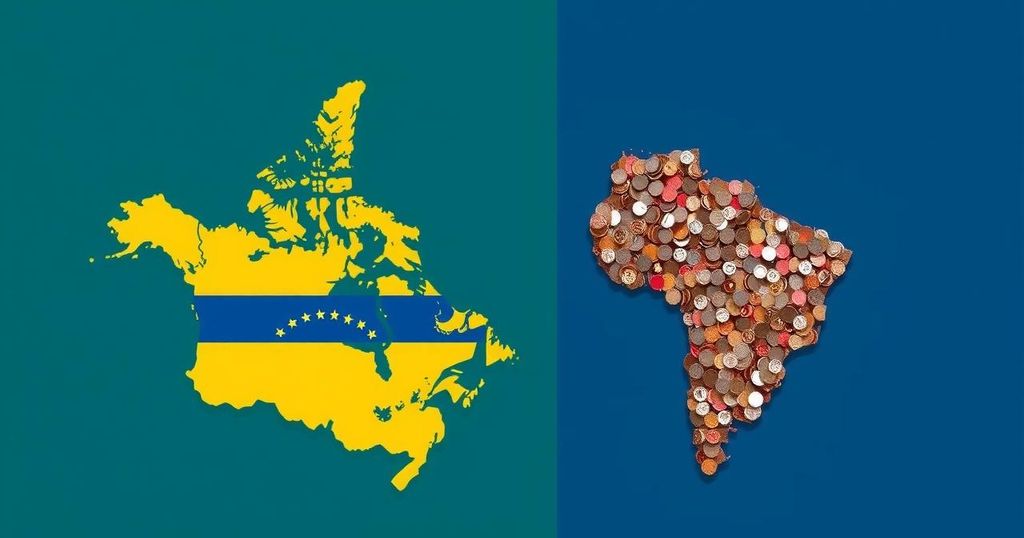Bolivia and Venezuela’s economic crises highlight the dangers of resource dependency and political mismanagement in South America. Bolivia is suffering from declining natural gas exports due to underinvestment, while Venezuela’s reliance on oil led to hyperinflation and mass migration. Both countries illustrate the critical need for economic diversification and effective governance to prevent further instability.
South America, endowed with vast natural resources, faces significant economic challenges that reveal the weaknesses within its political and economic systems. The economic downturn experienced by Bolivia and Venezuela exemplifies the vulnerabilities associated with resource-dependent economies. Although each country confronts distinct issues, both crises stem from similar causes, including economic mismanagement, reliance on exports, and political instability.
In Bolivia, the decline of the natural gas sector has led to severe economic distress. Once a model of resource-led growth, Bolivia is suffering from a drop in natural gas production owing to chronic underinvestment in exploration and extraction. By 2023, the country witnessed a nearly 40% decline in natural gas exports from their peak, resulting in a weakening trade balance and diminishing foreign reserves. Political turbulence further complicates these economic woes, as President Luis Arce grapples with internal strife and growing public discontent due to rising prices and shortages of goods.
Venezuela illustrates a more acute case of economic disintegration. With the largest proven oil reserves in the world, Venezuela should have thrived, but its excessive dependence on oil exports, coupled with gross mismanagement and corruption, has led to catastrophic outcomes. The 2014 collapse of oil prices precipitated a severe downturn, worsened by international sanctions aimed at the Maduro administration. Hyperinflation, which reached an astounding 1,700,000% in 2018, has obliterated the purchasing power of citizens, driving millions to flee the country and triggering a humanitarian crisis.
Both Bolivia and Venezuela exemplify the pitfalls associated with over-reliance on specific resources. When global market conditions faltered, both nations struggled economically due to inadequate diversification. Additionally, political instability has aggravated the economic deterioration. While Bolivia grapples with conflicts within its leadership that hinder governance, Venezuela’s authoritarian regime alienates international partners and heightens economic isolation.
Nevertheless, the two countries differ in their approaches to handling these crises. President Arce of Bolivia has made efforts to attract foreign investment and diversify the export base, though these initiatives have been stifled by political infighting and infrastructural deficits. In stark contrast, the Maduro regime in Venezuela has resorted to authoritarian practices to suppress dissent, seeking respite from sanctions through closer ties with nations such as China and Russia. While these measures provide temporary relief, they do not remedy the fundamental economic issues.
The economic turmoil in Bolivia and Venezuela serves as an important lesson for the broader South American context. These cases highlight the critical consequences of resource dependency and the need for robust governance and economic reforms. As the continent navigates its future, the decisions made now will critically influence whether it can overcome the cycles of fragility and emerge more resilient.
The economic crises in Bolivia and Venezuela serve as significant illustrations of the challenges faced by resource-dependent economies in South America. Both nations, once considered prosperous due to their substantial natural resources, have encountered severe downturns due to poor economic management, political instability, and over-reliance on specific commodities. The lessons derived from their experiences underline the importance of diversification in economic strategies and the necessity for sound governance to withstand external shocks and internal strife.
In conclusion, the economic challenges faced by Bolivia and Venezuela underscore the inherent risks of resource dependency coupled with poor political management. Both countries illustrate the need for comprehensive reforms to foster economic resilience and political stability. For South America to advance sustainably, it must heed the lessons provided by these crises and prioritize diversification and effective governance to mitigate the risks of future economic turmoil.
Original Source: www.firstpost.com







